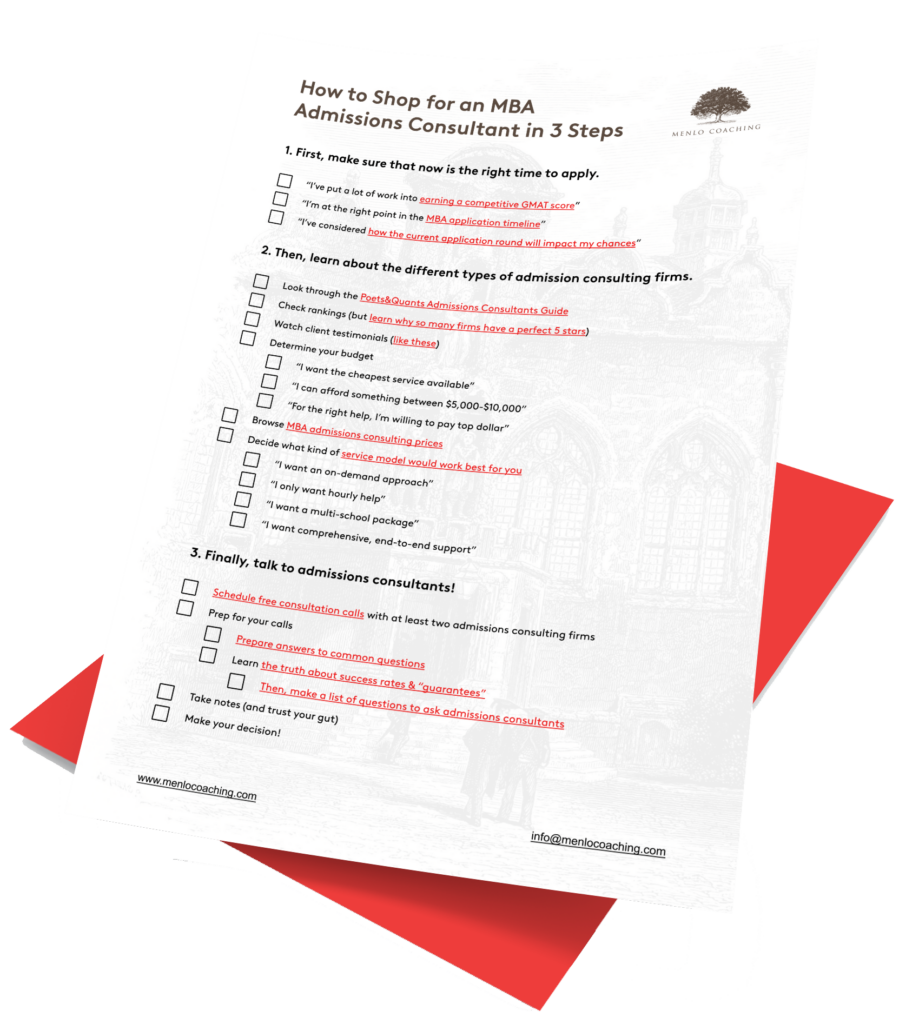If you are wondering which MBA application round you should apply in—rush to submit your MBA applications in Round 1, or spend more time polishing your applications and submit in Round 2—you probably want to know how each round impacts your odds of acceptance.
There is no single “round 1 vs. round 2 acceptance rate” that applies to every MBA applicant. Deciding which application round you should apply in for business school depends on a complicated set of factors, including:
- Whether you’ve already achieved a great GMAT score
- Whether you’ve visited your target business schools
- Your schedule at work—how much time do you have to devote to your applications?
- Your profile—how many applicants from your industry and region will the school see?
- How competitive are your target MBA programs?
- Whether you’re expecting any big developments soon (like a promotion at work)
Why Are Round 1 MBA Applications Usually Preferred?
To understand this, you have to first understand how the MBA admissions process works generally. Business schools are not just crunching the numbers and selecting the students with the best GMAT scores, GPA, and highest current compensation. Among other problems, this could bring in a group of students who would all compete for the same very narrow set of jobs, and lead to groupthink in classroom discussions.
Instead, MBA admissions committees are building a mix of students from different backgrounds, because that produces the most exciting classroom environment and balances the students across the different career paths represented in the school’s recruiting portfolio.
This means that an MBA program will admit only a certain number of applicants from each cohort. Although an admissions office may not define cohorts and quotas formally, they will always balance the class to include a mix of men and women, different regional backgrounds, different industries and roles, and more.
Thus, an admissions officer is really considering two questions when they evaluate your application:
- Are you qualified to attend the school?
- Have they already admitted enough candidates with profiles that are similar to yours? If so, they may need to admit other profiles in order to balance the class.
When you apply in Round 1, they haven’t admitted anyone yet, so there’s zero risk of being rejected because they’ve already admitted other applicants from your cohort. Furthermore, 100% of the year’s scholarship budget is still available, which means that the chances of winning an MBA scholarship are also higher.
If you are well-prepared to submit in Round 1, you should always do so. Besides the reasons discussed here, business schools also have more flexibility to admit students with lower GMAT scores (because there’s still an opportunity in later rounds to admit students with higher GMAT scores to balance things out).
If you are from an over-represented category, one where business schools will see a large number of well-qualified individuals in the applicant pool—e.g. Indian men in the tech industry—it is especially important to submit your applications in Round 1 of the year you apply.
Can’t business schools correct for this because they “know” who is going to apply in each round?
Sort of. Business schools have a lot of historical data about the quantity and quality of applications they can expect to receive in each round. But, as they say in the finance industry, past performance is no guarantee of future results. Many things can happen that might impact the volume or quality of applications to a school, and the likelihood of admitted students to enroll. For example:
- Riots and demonstrations in Charlottesville caused big disruptions to the volume and quality of applications at UVA Darden
- MBA rankings are often released in the spring, and a lower ranking could hurt a school’s ability to convert admits into enrollments. Better to lock down those enrollments and deposits early…
Thus, MBA programs would usually prefer to accept a great applicant in Round 1 rather than waiting and hoping that an incrementally better applicant might show up in Round 2, even if historical data shows that it’s possible.
When is a Round 2 MBA Application Better?
Round 2 is better if you can make meaningful improvements in your profile. This includes:
You need to raise your GMAT
The GMAT is an important component of your application. If you don’t have the time to maximize your GMAT score—with enough time left over for the other parts of your application—you should postpone. If you’re in an over-represented category, you should consider postponing until Round 1 of the following year rather than Round 2 of the current year.
You haven’t researched your target MBA programs
Conducting detailed research on your target MBA programs (see MBA Networking Tips) is an important part of convincing a business school to admit you. Schools want to admit students who care enough about their program to research it thoroughly before deciding to apply and have a good plan for how they’ll use their time at the school to achieve their own career goals and contribute to their classmates.
Campus visits are the best way to do this, and if you haven’t wrapped these up before the summer, then (at most schools) you won’t be able to complete them before Round 1 deadlines.
If you don’t research your target programs… you may be caught flat-footed.
Something big is happening soon
If you’re expecting a big promotion at work, your application may be stronger when you submit after this happens — especially if the promotion shows evidence that you’ve taken the first step toward achieving your post-MBA career goals.
You don’t have enough time to write good applications
Figuring out your career goals, fit with different schools, and which parts of your personal story might be interesting to admissions committees are creative tasks that take time. You won’t produce your best work if you rush it without considering numerous MBA admissions resources.
If one of these cases applies to you, then you’ll probably be a stronger applicant in Round 2. The advantages of a higher GMAT, a better understanding of the school’s program, a promotion at work, or good quality application materials outweigh the other considerations.
But I’ve read data from the GMAT Club and Clear Admit decision trackers that says…
We’ve seen the same data, which has shown different patterns over time. The data may or may not apply to your particular situation:
- Round 2 includes a number of last-minute applicants. (If they had planned ahead… they would have applied in Round 1). If you are a well-prepared applicant who is targeting Round 2 because you’re spending the time to improve your profile, you’re likely to beat the overall averages.
- The decision trackers represent only a small segment of the total applicant population. Forums like the GMAT Club include a large number of international applicants, some of whom are in over-represented categories where the Round 1 vs. Round 2 issue is more important.
- On the other hand, international applicants who intend to return to their home country after the MBA are in greater demand after recent tightening on the issuance of H-1B Visas and may see the opposite trend.
If you want an individual assessment, contact us.
When is Round 3 Safe?
When we say “Round 3”, we really mean the school’s final application round, which may actually be Round 4 or Round 5 at some schools.
There are two cases where Round 3 may be safe and reasonable for you:
- You are in an under-represented category in the applicant pool. For example, you may be an under-represented minority (defined by US schools as Hispanic, Native American, or African American), or you may be in an unusual and exciting career field, such as being a successful entrepreneur. If you’re a great applicant in an under-represented category, it’s likely that the school is still looking for more candidates like you in Round 3.
- You are applying to a less-selective school, probably in the Top 25 range rather than the Top 10 range of MBA programs. Because these schools receive fewer applications, and convert fewer offers into enrollments, they sometimes struggle to fill the class with well-qualified students. If you are targeting these schools, Round 3 may be no problem for you.
Splitting MBA Applications Between Rounds: Usually a Bad Idea
It can be tempting to spread the work of your applications over a longer period by targeting some schools (usually your reach schools) in Round 1 and filing the other applications in Round 2. In most cases, you should submit everything in the same application round:
- The incremental work for each application is less than you think. Once you’ve figured out your career goals, written your MBA personal story, and created your development plan during the MBA, writing another application is a manageable task.
- By getting all of your decisions on the table at once, you have a stronger position to negotiate your financial aid, and you avoid the risk of putting down a deposit at one school only to walk away from that when you get a better offer later.
- Round 1 decisions come out only a short time before Round 2 deadlines, so it’s unrealistic to wait until you have the Round 1 decisions before deciding whether to invest the effort of producing Round 2 applications. If you’re dinged from your Round 1 schools in mid-December, will you really have the time and energy to write incredible Round 2 applications over the Christmas break?
We hope this helps you to make a good decision about when to apply for your MBA.
Maximize your chances of success by applying in the right round with personalized advice from our dedicated MBA admissions consultants.






